If there is a hero in this book of villainy, it is Bob Bowman, who has shown that it is possible not only to make unseemly stacks of money from sport but to invest the profits for the collective good. Indeed, much the best of Mike Jakeman's five "straightforward recommendations to reshape the environment to be more conducive to competitive, entertaining Test cricket" is "find cricket's Bob Bowman".
Bowman is one of those people you want to loathe but, in the end, can't help but admire. A prosperous investment banker at Goldman Sachs and state treasurer for Michigan before he turned 30, he went on to become chief financial officer for Sheraton Hotels then head honcho at its parent company, ITT. Leaving in search of a fresh challenge, he was soon snapped up to run what became Major League Baseball Advanced Media, an outfit jointly owned by the 30 major league clubs and better known, somewhat fittingly, by the acronym BAM - a suitably onomatopoeic description of its impact as a centralised web portal streaming live matches to baseball fans.
Jakeman sees BAM as a business plan worth copying, one that, if handled correctly and sensibly, could sustain and even inspire the lower orders at a time when Test cricket ranks a distant third on the list of priorities for administrators and public alike. That he cannot envisage the Full Members cooperating says much for the difference between domestic and international sport. It also sums up everything that is wrong with cricket right now.
Together with the forthcoming documentary by Sam Collins and Jarrod Kimber, this entirely welcome tome (though cri de coeur might be a better description) comprises a double-barrelled blast from aficionados who want to save Test cricket, even though conventional wisdom has it that they are all too young to have such heartfelt concerns for the well-being of the planet's finest trivial pursuit.
In some ways, it is tempting to tell them not to fret so. Imagine dying shortly after the 1975 World Cup final and being reborn now. The reaction to a swift update would surely run along the following lines: "You mean one-day games didn't kill off Tests? You mean they brought in day-nighters in DayGlo togs and that didn't do the trick? You mean they've survived all that and the 20-over slog! I suppose the next thing you'll tell me is that the dodo hibernated for a century but now everyone eats dodoburgers."
All the proportion in the world, though, should not blind us to the genuine nature of the threat now confronting the five-day game, as we are deftly and vividly reminded by Jakeman, who as a writer with the Economist Group has the advantage of both distance and expertise. While there is little new here, he has taken a timely snapshot of the modern game and all its foibles; timely, because we may well be nearing a tipping point.
Each chapter deals with a different component, a different area of concern: tours, formats, pitches, technology, fixers and broadcasters. Examples of administrative dithering and bone-headedness abound, from South Africa's swift about-turn on billing Tests with England as "icon" series, and hence being guaranteed five instalments, to the way T20 has made a mockery of the Future Tours Programme. As Jakeman reasons, there is no need to impose a two-tier Test schedule because that, more or less, is what we already have.
Much the biggest fly in the ointment, of course, is the ICC, surely the most disunited governing body in major international sport, its processes distorted by India's economic strength and bargaining power. Sadly, for all the author's passionate advocacy of the little guys and his all-round idealism, he cannot envisage any significant improvement without accepting the sensible but almost entirely rejected recommendations of the Woolf Report - but then he's hardly alone on that score.
There are small reasons to gripe. The grasp of history isn't all it could be - to attest that Test tours half a century ago took place "more or less when the weather looked decent" is a one-liner in search of factual basis. The absorbing contents also deserve a better cover and a more compelling title - because they deserve a wide audience.
This is an illuminating and important book, written in measured, erudite tones and enlivened by detours such as a terrific passage in which Keith Stackpole is compared, not unfavourably, with Virender Sehwag, both of whom the author cites as victims of "an unspoken piece of cricketing prejudice, which says that aggressive players are somehow more indebted to luck than those who grind out their runs".
Needless to add, this book deserves, above all, to be read by those we entrust with running our precious game. A good look in the mirror never hurt anyone.
Saving the Test
Mike Jakeman
Ockley Books
206 pages; £9.99

Rob Steen is a sportswriter and senior lecturer in sports journalism at the University of Brighton

